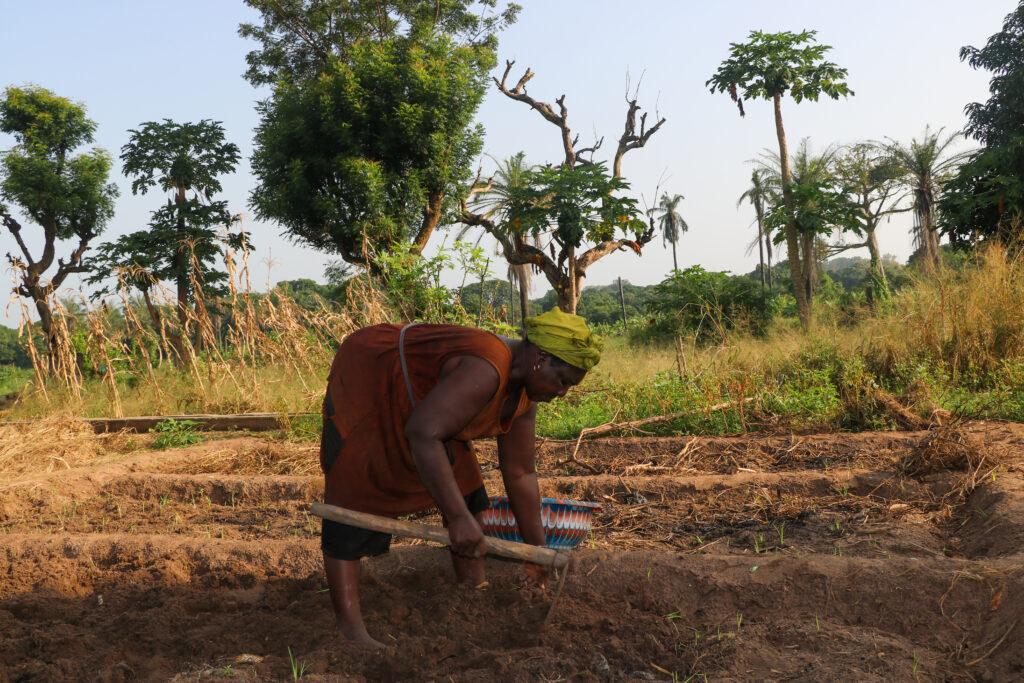Guinea-Bissau: Where land rights are not secure for women

Yet there is a direct link between the protection of women’s resources and food security.

Credit: Yasmina Nuny Silva
At 9am in Granja de Pessubé, agricultural workers, most of them women, have already been working for a couple of hours. They till their allocated vegetable garden beds on a shared public plot, trying to finish before the sun is high in the sky. The number of beds they have depends on how many they can afford to rent for the season. With the end of the rainy season, the most common crops are annual vegetables such as lettuce, Chinese cabbage – which can be harvested a few weeks after being planted – and rice.
In 2019, approximately 350 women worked at Granja de Pessubé. Some have been farming its fields for many years. Diminga Felipe has been here her whole life. Yet even now at her advanced age, she has not earned enough to buy land of her own. The little she makes has only ever been sufficient to meet her and her family’s subsistence needs. Without more space, she cannot produce more and accumulate capital. It also limits her access to microcredit from financial organisations because she has no collateral to offer.
Few women in Guinea-Bissau own the land that they work even though they dominate the agricultural sector, representing up to 75% of the agricultural workforce in the capital. Few have secure access to land at all. “Borrowing” or renting the land undermines women’s autonomy, their ability to sustain their families, and their food sovereignty.
“When there is a threat that land can be taken away from them, they produce timidly,” says Erikson Mendonça, a jurist and community rights specialist at the local NGO, Tiniguena. Many households continue to produce just enough for their own consumption and not commercialisation.
With urbanisation, land has often been seized for housing developments or bought by small enterprises. Urban expansion that threatens peri-urban farmland is most common in Bissau, Bafatá and Gabú. In other cases, women do not inherit the land that belongs to their husbands or fathers when they pass away.
Insecure land tenure also constrains agricultural productivity. When farmers cannot invest in sustainable land management and build capacity, their potential to grow their income and guarantee subsistence becomes limited too. By extension, it also means food supply to national markets is undermined. A World Food Programme report on food security in Guinea-Bissau found that net national food production was now large enough to meet food needs because most production came from smallholder farmers. In a country where the economy is agriculture-based, small-scale farming is not conducive to increasing the GDP.
These findings show the relationship between women’s land rights, food security and poverty. That is, protecting women’s production resources is necessary to ensure that the country’s food needs are met and, ultimately, to reduce poverty.
According to the law
Guinea Bissau’s constitution recognises the rights of all individuals to the private use of land without discrimination. But according to Carmelita Pires, a member of the Guinea-Bissau Association of Women Lawyers, the equality of sexes is not made explicit enough. As such, sexist customs continue: husbands, fathers, or family/village chiefs typically own the land on which women produce. And legal institutions remain ill-prepared to protect women’s civic rights.
“Right now, in this country, if the husband dies, a male relative can come in and take the widow’s land,” Pires explains.
Mendonça says that in rural areas men control the income women generate from crop sales. Remaining economically dependent, women have little say over where the income is invested and cannot grow their economic activities without their husbands’ consent. Income generated is first allocated to the man’s work.
A World Bank report on Guinea-Bissau found that “farming and harvesting of RCN [raw cashew nuts] is largely done by women on land owned by their husbands or fathers during the peak cashew season of March to May. Men have control over the sales and incomes generated by RCN.”

Felipe tilling her allotted garden plots. Credit: Yasmina Nuny Silva.
Most of the women farming in Granja de Pessubé content themselves with a few vegetable patches, even when those plots are smaller than what they could access before. “The place where I used to farm was bigger,” says Martina Sanca. Now, the income she can generate and the food she can produce has been capped. This means that she will have to spend the money she has made to buy what she was not able to produce rather than invest in building capacity by buying tools or hiring people.
This is a reality that many women contend with, and it is why Felipe, through age and illness, tends to her crops every day too. “I cannot afford to hire people to help me,” she says.
“Whatever I earn from this labour I will use it to pay for my children’s school,” is a phrase that is echoed over and again among urban and rural farmers. As the principal breadwinners in many households, women direct the income they generate toward meeting household needs and often report little to no support from their husbands. Of the women interviewed, all of them reported that their husbands had either passed away or were not contributing to household income.
Without extra economic or labour support, Bissau-Guinean women have not been able to increase their yields and transform their efforts into profitable and efficient businesses. Many are not even able to invest in accessible water sources and depend largely on rain for their horticulture.
The onset of the COVID-19 pandemic was an additional shock to already economically vulnerable producers.
Last year, when the first cases of the virus were reported, the country followed the example of many others in declaring a state of emergency. National markets were restricted with lockdown measures, limiting the hours of operation and the number of traders allowed per market.
According to Joaninha Sanca, it meant that many of their crops spoiled.
“Market traders were not buying from us as often because of the lockdown. Whenever they did, they bought only a little, not like before this illness. Since we don’t have any way to preserve our crops, they would end up spoiling.”
She says that she and her children would consume whatever they could, but still, the fall in their revenue threatened the sustainability of their horticulture and their livelihoods.
With the easing of restrictions and the general adjustment to the context of a pandemic, Joaninha is hopeful that business will improve, especially with the Christmas season. “My cabbages are growing, if you look at my garden beds, they look beautiful!”
“They won’t have to work like I do”
Across the country, women have come together to form farming associations and collectively better their lot. Farming associations have become widespread in response to poverty across farming communities and government instability. Many are affiliated with the central Association of Women in Economic Activity (AMAE) created in Bissau in 1992. Through agricultural cooperatives, some associations have been able to diversify their crops and secure capital. Sanca, who does not belong to an association, expressed her desire to join one because of the perceived benefits.
They have received support and attention from initiatives like Tiniguena’s Mulheres Rurais (rural women) who equip them with tools to make farming more efficient and promote collective production that will allow them to achieve economies of scale. These initiatives go further by ensuring a market for the crops; associations receive regular business by supplying school cantines to help fight malnutrition among children. The women are also trained and encouraged to participate in democratic and decision-making processes at the community level, helping them to have a say over their production and income.
Mendonça is optimistic that slowly, as more women-led associations mobilise, sexist norms will continue to be challenged and women will find economic autonomy. He recognises, though, that the chauvinism among formal authorities impedes progress.
Government intervention in Bissau-Guinean agriculture, in terms of land tenure policy and financing, remains weak because of chronic political instability. So, through the slow rates of change, women who do not benefit from belonging to associations will return to their plots tomorrow to continue producing at a small scale. With the support of the United Nations Development Programme, the Association of Women Lawyers continues its efforts to revise the constitution using a gendered lens so that women rights are explicitly protected under civil law. In the meantime, UN agencies and national and international NGOs intervene where the state falls short, supporting the self-advocacy of women’s associations as they challenge patriarchal customs.
While they may struggle to invest in their own production, the women are investing in their children’s education so that, as mother-of-four Felipe says, “they won’t have to work like I do…there is no money here.”
This article is part of On Food Security & COVID-19, a special series in partnership with OXFAM.






